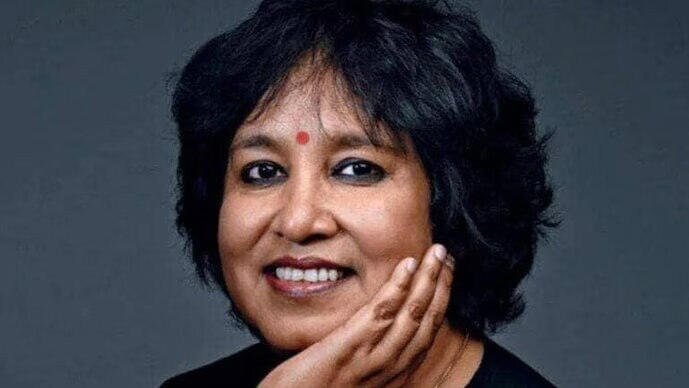Bangladeshi poet Taslima Nasreen, a lifelong rebel, believes that her compatriots who are troubled by atrocities against Palestinians should be equally concerned about the plight of minorities in their country.
At 62, the spark within Nasreen, which saw her reject conferences and write to expose hypocrisy and “misogynistic” religious practices in her society, has not died, and she strongly believes That it is his duty to continue the “good fight” against injustice. Whenever and wherever she finds it.
Nasreen said on Sunday, “I have heard that my fellow Bangladeshi citizens are very agitated about the atrocities on Palestinians and some even want to go to Palestine to help them. I personally do not want to help anyone anywhere in the world, including Israelis and Palestinians. I condemn atrocities.”
“However, I would like to point out that if my countrymen are so concerned about the atrocities resulting from attacks in Palestine and the flow of refugees, their conscience must also be troubled when even today there are attacks on minorities in Bangladesh and many people Are forced to leave their land and will become refugees elsewhere.”
Last month, an octogenarian poet from the Hindu community was beaten up in a long list of similar attacks in Bangladesh. In August 2023, a Human Rights Watch report by ‘Srishti o Chetona’, an organization, highlighted that “attacks on temples and other community properties” or general anti-minority abuses, threats of “expulsion from the country and ill-treatment” were among those incidents. Among those who were reported.
“Despite the impressive economic growth that my motherland has witnessed, Bangladesh is still witnessing a rise in fundamentalism. Gender imbalance remains a factor. Public and political space is being given to rank communalists,” the acclaimed poet said. Said, who in the past won the Simone de Beauvoir Award and the Sakharov Prize.
Nasreen’s writings won critical acclaim and global attention in the early 1990s. However, his radical writings exposing hypocrisy as well as fanaticism also enraged the Orthodox clergy in his homeland, some of whom passed ‘fatwas’ against him, forcing him to flee to Europe and America .
Later she came to India and now lives in Delhi.
He alleged, “On one hand, Bangladesh’s per capita income is increasing and new infrastructure is being built, on the other hand Qaumi Madrassas which teach fundamentalism to children are being encouraged.”
Recent years have seen the rise of Hefazat-e-Islam in Bangladesh, which has been used by the ruling Awami League to counter its ideological rivals BNP and Jamaat-e-Islami Bangladesh.
However, critics such as Nasreen view Hefazat’s prominence with concern because, over the past few years, the government has acceded to key conservative Islamic demands – including removing stories and poems by secular and non-Muslim authors from textbooks, Including the removal of the Lady Justice statue. before the Supreme Court of the country, and to recognize the degrees of Qaumi Madrasas controlled by the organization as equivalent to master’s degrees.
“Sheikh Hasina is extremely popular. She could have easily chosen to restore the 1972 constitutional provisions on secularism. She could have easily brought laws on gender equality in marriage, divorce and property inheritance rights… but these things are now It hasn’t happened yet.” The author told.
Speaking about the upcoming elections for the Parliament of Dhaka, he claimed, “Elections are not really elections in Bangladesh,” echoing concerns expressed in the West over the quality of elections in his home country.
He also criticized the BNP’s denial of permission to opposition leader Begum Khaleda Zia to travel. Nasreen said, “Khaleda Zia ousted me, banned my books in Bangladesh. Still I would say that she should be allowed to go abroad for treatment.”
The elections are scheduled to be held in December 2023–January 2024 and talks are still ongoing between political parties on participating in the elections. The main opposition BNP has demanded elections under a caretaker government, but the ruling Awami League is not ready to accept this condition.

